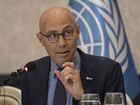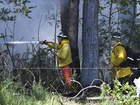The head of this year's U.N. global climate summit has urged more availability of funds to fight climate change in the Caribbean during a regional meeting in Barbados.
Sultan al-Jaber, the United Arab Emirates' minister of industry, noted that high costs have prevented island nations from quickly adopting renewable energy as they face what he said was some of the world's harshest climate impacts.
 Full Story
Full Story
Authorities were on standby to evacuate more people in southeastern Norway Friday, where huge amounts of water, littered with broken trees, debris and trash, were thundering down the usually serene rivers after days of torrential rain.
The level of water in swollen rivers and lakes continued to grow despite two days of dry but overcast weather, with houses abandoned in flooded areas, cars coated in mud and camping sites swamped.
 Full Story
Full Story
Hawaii went from lush to bone dry and thus more fire-prone in a matter of just a few weeks — a key factor in a dangerous mix of conditions appear to have combined to make the wildfires blazing a path of destruction in Hawaii particularly damaging.
Experts say climate change is increasing the likelihood of these flash droughts as well as other extreme weather events like what's playing out on the island of Maui, where dozens of people have been killed and a historic tourist town was devastated.
 Full Story
Full Story
Tropical Storm Khanun was pouring intense rain on South Korea on Thursday, turning roads into chocolate-colored rivers and leaving at least one person dead as it advanced north toward major urban centers near the capital.
More than a foot of rain fell in eastern and southern areas after the storm made landfall on the mainland in the morning. Emergency workers responded to increasing reports of flooding and landslides by the afternoon.
 Full Story
Full Story
Thousands of Hawaii residents raced to escape homes on Maui as blazes swept across the island, destroying parts of a centuries-old town and killing at least 36 people in one of the deadliest U.S. wildfires in recent years.
The fire took the island by surprise, leaving behind burned-out cars on once busy streets and smoking piles of rubble where historic buildings had stood in Lahaina Town, which dates to the 1700s and has long been a favorite destination of tourists. Crews battled blazes in several places on the island Wednesday, and the flames forced some adults and children to flee into the ocean.
 Full Story
Full Story
The United Nations' human rights chief on Wednesday warned that Iraq's water crisis could affect other countries in the region.
Severe water shortages in Iraq because of climate change and government mismanagement have destroyed wheat and fruit harvests, and killed off fish and livestock. Humanitarian organizations have warned for years that drought and mismanagement could deprive millions of people of water from the Euphrates and Tigris Rivers, which also run through neighboring war-torn Syria.
 Full Story
Full Story
More than 1,000 firefighters are battling a series of wildfires in Portugal as it and neighboring Spain experience several days of extreme summer heat, with temperatures in many areas rising above 40 degrees Celsius (104 F).
Three major fires raged in Portugal on Tuesday, with the biggest in the southwest near the town of Odemira, where on Monday about 1,400 people were evacuated from villages and a camp site as a precaution. They were gradually returning home on Tuesday.
 Full Story
Full Story
Wildfires in Hawaii fanned by strong winds burned multiple structures, forced evacuations and caused power outages in several communities late Tuesday as firefighters struggled to reach some areas that were cut off by downed trees and power lines.
The National Weather Service said Hurricane Dora, which was passing to the south of the island chain at a safe distance of 500 miles (805 kilometers), was partly to blame for gusts above 60 mph (97 kph) that knocked out power as night fell, rattled homes and grounded firefighting helicopters.
 Full Story
Full Story
The Southwestern U.S. is bracing for another week of blistering temperatures, with forecasters on Monday extending an excessive heat warning through the weekend for Arizona's most populated area, and alerting residents in parts of Nevada and New Mexico to stay indoors.
The metro Phoenix area is on track to tie or to break a record set in the summer of 1974 for the most consecutive days with the high temperature at or above 110 degrees Fahrenheit (43 Celsius). Even the morning low temperatures are tying historic records.
 Full Story
Full Story
Rains and winds were growing in southern South Korea Wednesday as a tropical storm drew closer to the Korean Peninsula, where it was forecast to slam into major urban areas.
Dozens of flights and ferry services were grounded and tens of thousands of fishing vessels evacuated to ports as government officials raised concern about potentially huge damages from flooding, landslides and tidal waves triggered by the typhoon-strength winds.
 Full Story
Full Story



